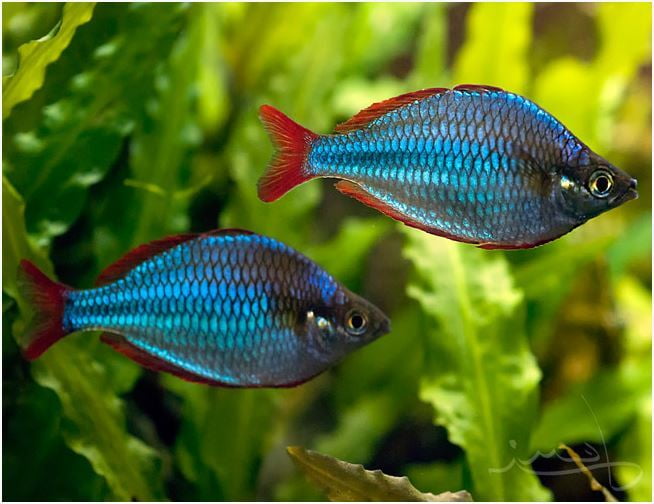
Praecox Neon Rainbow
Melanotaenia praecox, commonly known as the Dwarf Neon Rainbowfish or Praecox Rainbowfish, is a vibrant and popular species of rainbowfish in the aquarium hobby. Here are some key characteristics and information about Melanotaenia praecox:
Appearance: Melanotaenia praecox is known for its beautiful and distinctive coloration. The body is generally silver-blue, and it has a neon iridescence along its sides, especially in males. The fins may have red or orange accents.
Size: Adult Dwarf Neon Rainbowfish typically reach a size of about 2 to 2.5 inches (5 to 6 centimeters).
Habitat: This species is native to the Mamberamo River system in Papua, Indonesia. In the wild, they inhabit clear and slow-moving waters, often found among aquatic vegetation.
Behavior: Melanotaenia praecox is a schooling fish and should be kept in groups of at least six individuals. They are generally peaceful and suitable for community aquariums.
Diet: In the aquarium, they are omnivorous and will accept a variety of foods, including high-quality flake food, pellets, live or frozen foods such as brine shrimp and daphnia.
Tank Requirements: Provide a well-planted aquarium with open swimming areas. They prefer slightly acidic to neutral water conditions with a temperature range of 75-79°F (24-26°C). Good filtration and regular water changes are important for their well-being.
Compatibility: Dwarf Neon Rainbowfish are generally peaceful and can be kept with other non-aggressive fish species that share similar water requirements. Avoid keeping them with overly aggressive or territorial tankmates.
Breeding: Breeding Dwarf Neon Rainbowfish can be achieved in a well-maintained aquarium. Use fine-leaved plants or a spawning mop for egg deposition. The adults may eat their own eggs, so it's common practice to provide a separate breeding tank or remove the eggs for hatching.
Melanotaenia praecox is appreciated not only for its appealing appearance but also for its active and schooling behavior. Providing a suitable environment and proper care will help ensure the well-being of these colorful and lively aquarium residents



